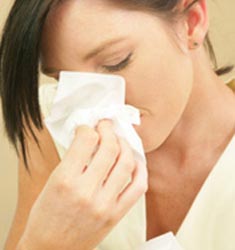Viral infections carry lingering heart risks
 Cologne, Germany - Exercise usually helps strengthen the heart but after a bout of flu or another viral infection, it can have deadly consequences.
Cologne, Germany - Exercise usually helps strengthen the heart but after a bout of flu or another viral infection, it can have deadly consequences.
It's advisable to three or four days pass before resuming your workout routine.
The condition, myocarditis, slows down the return to the gym. The heart muscle tissue can become infected "more often than you'd think," says Hans-Georg Predel, head of the Institute for Circulatory Research and Sports Medicine at the German Sports Academy in Cologne.
And to exacerbate matters, myocarditis often goes unnoticed. "Studies have shown that many of those afflicted never even notice the problem."
Regardless of the viral infection - whether it is flu, a cold, measles, chicken pox or hepatitis - there's always the risk the virus can effect the heart. Stress increases the risk that the muscle surrounding the heart can become infected.
About 5 per cent of deaths among younger athletes can be linked to complications from myocarditis. "An accelerated return to strenuous activity is a huge health risk," warns Hans-Joachim Trappe of the Ruhr University in Bochum. "If you recover from an infection slowly and face an unexplained drop in performance, that can be a sign that the heart's functions have been disrupted."
But the symptoms are barely discernible from the original health problem. "You have to keep a close eye on the body," says Predel. Severe exhaustion, disruptions of heart rhythms, a racing pulse and chest pains are all possible signs of myocarditis.
"Don't hesitate in such a case. Go straight to the doctor," says Eckhart Fleck, director of cardiology at the German Heart Centre in Berlin. Any sports-related problems that manifest themselves for the first time or grow worse need to be taken seriously and cleared up.
Most cases of heart muscle infection go undiscovered and the body heals itself without consequences.
Still, the sniffles don't mean you have to give up your workout, but, "Just take it slow," advises Predel.
A flu takes time to work itself out. And it's very important to take the medicine as prescribed by a doctor and according to the instructions and for the full regimen. Anyone who wants to work out with a cold should be checked out first.
But it's not always easy for a doctor to diagnose an infection of the heart muscle. "There's no method that catches every form of myocarditis," says Fleck.
The basic check-up requires an ultrasound to detect changes in the heart muscle. Blood tests and an EKG are often part of the check-up. A magnetic resonance imaging test is the best test: "But even here, there's no 100-per-cent security."
Rest and recovery are usually the best medicine. "If the heart is infected, it needs some relief." Swap your running shoes for a few weeks in favour of the sofa or stay in bed, if that's what your doctor prescribes. Naturally, take medication as directed, says Fleck.
Anyone aged 35 and older belongs to the group at risk of a heart muscle infection.
"Additionally, factors such as obesity, diabetes, or a lack of exercise, smoking, high blood pressure and any congenital abnormalities all effect the heart muscle," explains Predel.
Those contemplating a gym routine this spring should consult a doctor beforehand for a thorough check-up, advises Trappe. Anyone with a heightened number of risk factors should undergo EKG tests, both at rest and during exercise. And always think about their physical limitations.
INFOBOX: Health check for competitive sports
Heart check-ups before competitive sports events have been standard in Italy for more than 25 years. Experts from the European Society of Cardiology say they are certain that this has helped prevent many sports-related deaths.
The average age of participants in marathons has increased in recent years.
"The runners are, on average, 40 years old," says Hans-Georg Predel, a sports physician at the German Sports Academy in Cologne. That means increased risks.
German groups have begun to err on the side of safety and demand doctor's consent forms before allowing some people to participate in events. (dpa)